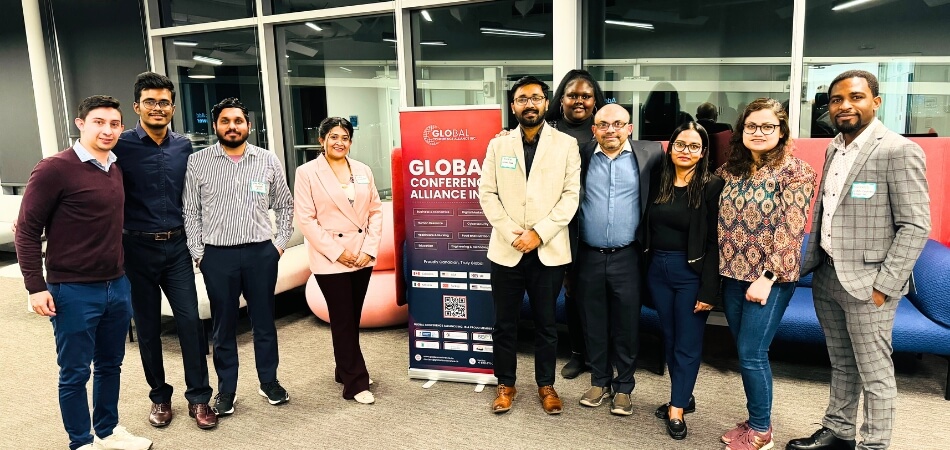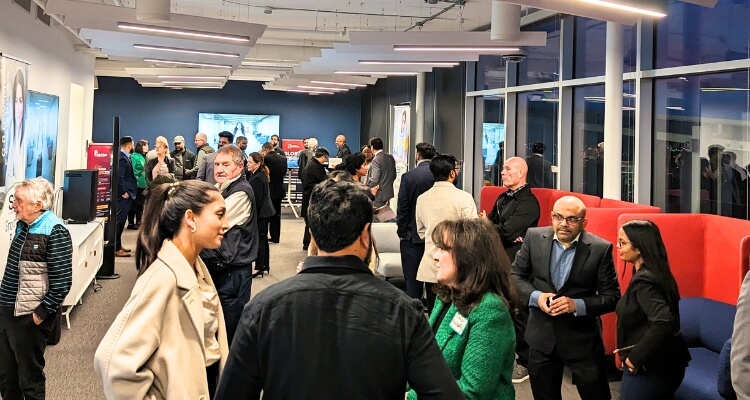Connecting with peers, sharing research, and expanding your professional circle—networking is a crucial part of any academic conference. But knowing how to network at an academic conference effectively can be intimidating, especially if you’re new to the scene. Yet, building meaningful relationships here can boost your academic growth.
To network successfully, start by preparing beforehand—know who’s attending, what topics are trending, and plan how you’ll introduce yourself. During the conference, be proactive, engage in conversations, attend sessions, and exchange contacts. Follow up afterward to maintain those valuable connections.
Ready to turn your networking skills and make lasting professional relationships? Continue reading to discover strategies, tips, and best practices for mastering networking at your next academic conference.
Significance of Networking at an Academic Conference
Networking at an academic conference is more than just mingling—it’s a valuable opportunity for personal and professional growth. It helps you engage with fellow researchers, gain new insights, and potentially collaborate on groundbreaking projects. Here’s why networking is significant at such events:
Exchange of Ideas
Academic conferences are hubs of innovation, where attendees present their latest research findings and concepts. Engaging in conversations here helps you gather diverse perspectives that can refine your own work. It’s an opportunity to learn from others, inspire new ideas, and foster intellectual growth.
Building Professional Relationships
Establishing connections at these conferences can lead to lasting professional relationships. By networking, you can find mentors, collaborators, and even potential co-authors for future projects. Among the many advantages of attending academic conferences, building a strong network in your field can significantly benefit your career over time.
Career Advancement
Networking is a gateway to new opportunities, such as job offers, collaborations, and speaking engagements. Engaging with influential figures in your field may open doors to conferences, research funding, or positions you hadn’t considered. It’s a chance to showcase your work to the right people and make a lasting impression.
Access to Unpublished Knowledge
Networking often grants access to information not yet published or widely discussed. Researchers tend to share insights and ongoing work during informal discussions, offering you a sneak peek into the latest developments. This insider knowledge can be invaluable for staying ahead in your research area.
Effective networking isn’t just about making contacts; it’s about cultivating meaningful relationships that can transform your academic journey. Make the most of every opportunity to connect, share, and learn at your next conference.
How to Network at An Academic Conference?
Networking at an academic conference can be incredibly rewarding. It opens doors to new opportunities and collaborations. Here are the top seven methods to network effectively.
Introduce Yourself
Start with a clear and confident introduction. Briefly state your name, affiliation, and research interests. Keep it concise to make a memorable impression. When introducing yourself, personalize your introduction to the context of the conference. Mention specific interests related to the event. This helps in finding common ground with others.
Initiate conversations with a friendly smile and a firm handshake. Be prepared to share a brief but interesting fact about your work. This can help in making a lasting first impression.
Participate in Sessions
Attend various sessions and actively participate. Engage with the content and presenters. This shows your interest and enthusiasm. Sitting in the front rows can help you stay engaged and visible. Take notes and prepare questions to ask. Active participation makes you stand out to both peers and presenters.
After the sessions, approach the speakers with specific comments or questions. This shows your dedication and interest in their work. It can also lead to deeper discussions and connections.
Engage and Ask Questions
Engaging during sessions is essential. Ask insightful questions related to the topic. This demonstrates your knowledge and curiosity. Prepare questions beforehand to feel confident. Thoughtful questions can spark interesting conversations, especially when discussing upcoming conferences to attend with peers. This often leads to further discussions outside the session.
When asking questions, make sure they are clear and concise. Avoid dominating the conversation; instead, encourage others to share their views. This fosters a collaborative and engaging atmosphere.
Be Approachable
Maintain a friendly and open demeanor. Smile and make eye contact with others. This makes you seem more approachable. Approachability invites others to initiate conversations. It creates a welcoming atmosphere. People are more likely to connect with you.
Dress appropriately and maintain positive body language. Avoid crossing your arms or looking distracted. Being approachable is about showing openness and willingness to engage.
Listen Actively
Active listening is key in networking. Show genuine interest in what others are saying. Nod and respond appropriately. This makes people feel valued and heard. Active listening builds trust quickly. It’s essential for forming strong connections.
Ask follow-up questions based on what the speaker has said. This shows that you are genuinely engaged. Summarizing their points can also confirm your understanding and keep the conversation flowing.
Ask Questions After People Speak
After someone speaks, ask follow-up questions. This shows you’re paying attention and interested. It encourages deeper conversations. Follow-up questions help clarify and expand discussions. They make interactions more engaging. This approach often leads to lasting connections.
Ensure your questions are relevant and thoughtful. Avoid yes/no questions; opt for open-ended ones. This encourages more detailed responses and richer conversations.
Plan Your Exit Strategy
Know when and how to gracefully end conversations. Have a polite exit strategy ready. This shows respect for others’ time. Ending conversations well leaves a good impression. It allows you to network with more people. Practice makes this skill easier to master.
You might say something like, “It was great talking with you. I want to catch a few more people before the next session.” This keeps the door open for future interactions.
Effective networking at an academic conference requires practice and preparation. By following these methods, you can build meaningful connections. Keep honing your skills and enjoy the benefits of a strong professional network.
Common Mistakes to Avoid When Networking at Academic Conferences
Networking at academic conferences can be rewarding, but there are mistakes you need to avoid to ensure your efforts are successful. Being aware of these common mistakes can help you make a lasting, positive impression:
Lack of Preparation
Going to a conference without doing your homework is a missed opportunity. Research the attendees, sessions, and speakers beforehand to know who to approach and what topics to discuss. Being well-prepared helps you engage confidently in conversations.
Focusing Only on Yourself
Talking solely about your work can make you appear self-centered. Aim for a balanced conversation by asking questions about the other person’s research or interests. Effective networking is about creating a two-way dialogue, not just self-promotion.
Overloading with Business Cards
Handing out business cards without meaningful interaction is ineffective. Focus on quality over quantity—connect genuinely first, and exchange cards only when it feels natural. A strong connection is more likely to lead to follow-ups.
Staying in Your Comfort Zone
Sticking only to familiar faces limits your networking potential. Step out of your comfort zone and approach new people to broaden your network. You never know which unexpected connections might become valuable in the future.
Not Following Up
Failing to follow up after the event wastes the effort put into making connections. Send personalized emails or messages within a few days to continue the conversation. This keeps the relationship alive and shows your interest in further collaboration.
How to Follow Up with New Connections After the Conference?
Following up with new connections after an academic conference is essential for building lasting relationships. An effective follow-up can turn a brief encounter into a lasting professional relationship. Here’s how you can effectively follow up:
Share Relevant Resources
Find a relevant article, paper, or event and share it with your new connection. Sharing resources is part of an effective follow-up after an academic conference and shows your continued interest in the relationship. It’s a simple yet impactful way to keep the conversation going and maintain engagement.
Send a Personalized Email
Start with a friendly email a few days after the conference. Mention a specific topic or moment from your conversation to make it personal. This shows genuine interest and reminds the recipient of your meeting, making it more likely for them to engage with you.
Connect on LinkedIn
Sending a LinkedIn connection request is a great way to stay connected long-term. Include a personalized message about where you met and what you discussed. This not only strengthens the connection but also keeps you updated on their professional activities and future opportunities.
Schedule a Follow-Up Call
If your initial conversation suggested potential collaboration or further discussion, propose a follow-up call or meeting. Be respectful of their time and offer a flexible schedule. This step solidifies the relationship and can lead to fruitful collaborations or opportunities.
Stay Consistent
Building a strong network takes time, so stay consistent in your interactions. Occasionally check in with your new connections, share updates, or comment on their achievements. Consistency helps maintain the relationship and keeps you fresh in their minds for future opportunities.
Effective follow-ups are key to nurturing relationships formed at conferences. With genuine engagement and thoughtful communication, you can turn short conversations into long-term professional bonds.
Tips to Find a Suitable Academic Conference to Network
Your professional growth can be significantly impacted if you attend the right academic conference to network. When you choose the right event, you will be able to meet relevant peers and experts. Here are some tips to help you find the perfect conference for your networking:
- Identify Your Goals: Define what you aim to achieve by attending the conference. This helps narrow down events that align with your objectives.
- Research Relevant Fields: Look for conferences related to your specific area of research. This ensures the attendees and topics will be relevant.
- Check Past Conferences: Review the history and reputation of the conference. Past events can provide insight into the quality and relevance.
- Consider the Location: Choose a conference in a convenient or strategic location. This can affect your ability to attend and network effectively.
- Examine the Schedule: Review the conference agenda and sessions. Ensure there are ample networking opportunities and relevant presentations.
- Evaluate the Speakers: Check the list of speakers and their backgrounds. Renowned speakers attract a high-quality audience, enhancing networking potential.
- Look at Attendee Profiles: Research the typical attendees of the conference. Understanding who usually attends can help you determine if it’s the right fit.
- Read Reviews and Testimonials: Seek feedback from past attendees. Reviews and testimonials provide insight into the conference’s value and networking opportunities.
Choosing the right academic conference is crucial for effective networking. By following these tips, you can ensure you attend events that align with your professional goals and interests. This strategic approach will maximize the benefits of attending academic conferences.
Frequently Asked Questions
When it comes to networking at an academic conference, attendees often have many questions about the best strategies and approaches. Here are some frequently asked questions that can offer additional guidance:
Should I Bring Business Cards to an Academic Conference?
Yes, bringing business cards is a good idea. It’s a quick way to share your contact information, making it easier for others to remember you. While digital exchanges are popular, having a physical card can leave a lasting impression and help initiate further conversations.
How Do I Make the Most of Coffee Breaks During a Conference?
Use coffee breaks as informal networking opportunities. Approach people standing alone or join small groups and introduce yourself. Keep conversations light and focus on getting to know others rather than diving straight into academic discussions.
Can I Network Effectively as an Introvert?
Absolutely! Introverts can do well at networking by focusing on one-on-one conversations instead of large groups. Prepare in advance with some questions or topics to discuss, and don’t hesitate to take short breaks to recharge during the event.
Is It Appropriate to Connect With Keynote Speakers During the Conference?
Yes, but timing is important. Approach them after their session when they’re open to questions or insights about their talk. Be respectful of their time and keep the conversation brief, unless they seem interested in continuing the discussion.
Is It Helpful to Attend Pre-conference Workshops for Networking?
Yes, pre-conference workshops can be great networking opportunities. They allow you to interact in smaller, more focused groups, making it easier to engage and connect. Plus, shared learning experiences often lead to more meaningful conversations.
Final Considerations
Networking at an academic conference can be both rewarding and impactful. It’s a chance to not only share your research but also build meaningful professional relationships that can last well beyond the event. Approach each interaction with curiosity and an open mind.
Mastering how to network at an academic conference involves preparation, active participation, and consistent follow-up. Remember, it’s not about collecting business cards; it’s about creating real connections. Engaging genuinely and thoughtfully can set you apart from the crowd.
As you attend your next conference, use these strategies to make the most of the event. Stay approachable, ask insightful questions, and always follow up. These efforts will help you expand your academic circle and open doors to new opportunities.








